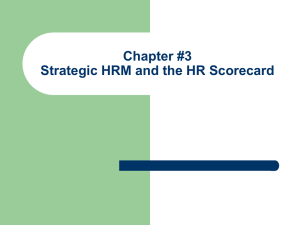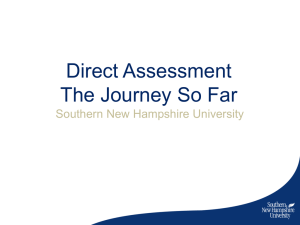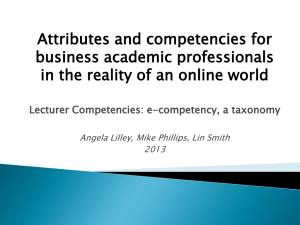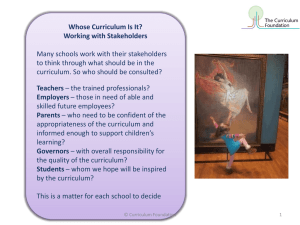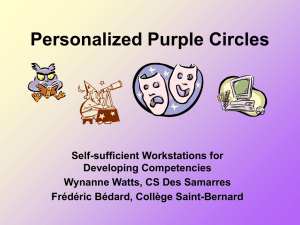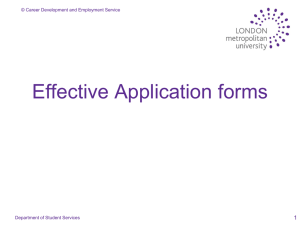Unit 2 B - National Union of Teachers
advertisement
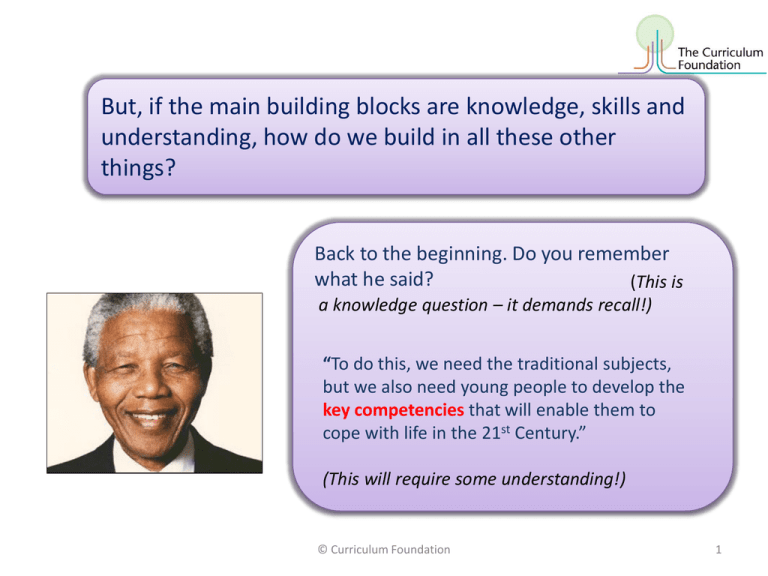
But, if the main building blocks are knowledge, skills and understanding, how do we build in all these other things? Back to the beginning. Do you remember what he said? (This is a knowledge question – it demands recall!) “To do this, we need the traditional subjects, but we also need young people to develop the key competencies that will enable them to cope with life in the 21st Century.” (This will require some understanding!) © Curriculum Foundation 1 Competencies are a combination of knowledge, skills and attitudes. They are acquired through the application of knowledge in meaningful situations. They help deepen learning and turn knowledge into understanding. They require the development of the right attitudes to apply the knowledge. Knowledge Skill Attitude © Curriculum Foundation Competence 2 The subjects provide the knowledge context. It it the application of that knowledge that develops the skills. Attitudes are developed though the teaching and learning approaches. Some will develop positive ones! Knowledge Subjects Skill Application of subjects Attitude Competence Teaching and learning approach Competence © Curriculum Foundation 3 All the high performing countries have a set of competencies at the heart of their curriculum. Do you recognise the flag below? New Zealand Key Competencies • Critical thinking and problem solving • Using languages, symbols and texts • Managing self • Relating to others © Curriculum Foundation 4 Whose flag is this? Singapore 21st Century Competencies • Decision making • Critical and media skills • Information and communication skills © Curriculum Foundation 5 And this one? South Korea Student Competencies • critical thinking and problem solving • communication • innovation and creativity • investigation • co-operation © Curriculum Foundation 6 Do you remember Andreas Schleicher from Unit 1? He is the head of the ‘PISA’ These are all competencies. international educational comparisons. He that: Sopoints PISAout measures competencies! “PISA tests students’ ability to: So we don’t have to choose between knowledge and skills. We can have both! • apply their learning In need both - and attitudes as • fact, thinkwe critically well - in order develop competencies. • solve problems • make judgements” You can find more from Andreas at: http://www.ted.com/talks/andreas_schleicher_use_data_to_build_better_schools.html © Curriculum Foundation 7 ED Hirsch also linked the two. He argued that it is not possible to develop a skill independently of a context of knowledge. His early research was about literacy, and he found that children performed better at a whole range of reading skills when they were familiar with the context of what they were reading. If they were reading about, say, ballet dancing and already know something about it, then their skills were better – even to the point of being able to recognise words they could not recognise in unfamiliar contexts. He argues that children from wealthier backgrounds tend to do better at school because they have a wider range of of knowledge and so are more likely to be familiar with any given context. © Curriculum Foundation 8 In his “Curriculum Design Handbooks”, Brian Male suggests that knowledge is important in itself, but it also provides a context for developing skills: “You can’t learn to solve a problem unless you have a problem to solve. You can’t learn to think critically unless you have something to think about. You can’t learn to work in a team unless the team has some activity to engage in. The curriculum subjects provide a rich source of problems, things to think about and activities. And when we apply learning through competencies, subject understanding becomes deeper. It is a win-win situation.” © Curriculum Foundation 9 So, what are the competencies? How many are there? There is no one ‘right’ set of competencies. Different countries have different sets – but there is a similarity around: • • • • Critical thinking – problem solving Working co-operatively Communicating well Innovation - creativity The current English Secondary National Curriculum has the 6 ‘Personal, learning and thinking skills” (PLTS). The neverimplemented Rose Primary Curriculum had the “Essentials of Learning and Life”. The new English National Curriculum does not include competencies – so, given their importance internationally, you might like to develop your own as a school. © Curriculum Foundation 10 Developing a Set of Competencies A good place to start would be with your ‘Stick Person’ from Unit 1. Have you listed any competencies here? Could you put things together? Are there any similarities with the international examples? Can you make a list? (You could start with AIVIRAS !) A word of warning: Don’t write too many. Most people find that four or five is a manageable number. Beyond that, they just get confusing. © Curriculum Foundation 11




